Eso fue entonces…. Foto por la Presidencia
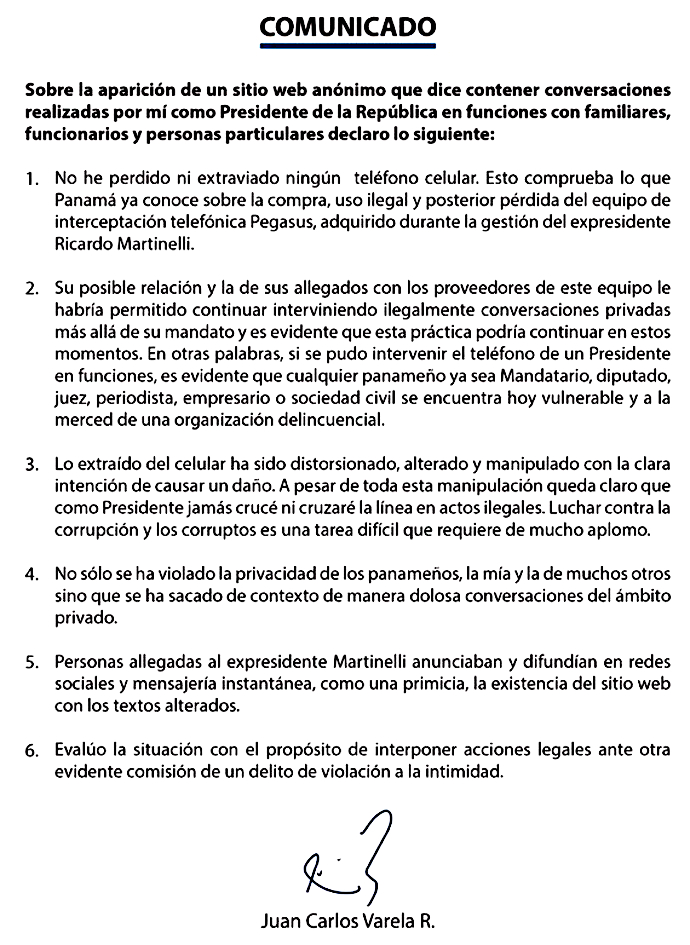
~ ~ ~
Estos anuncios son interactivos. Toque en ellos para seguir a las páginas de web
The National Assembly, with riot police and a temporary fence to keep people at least a block away from their building, has installed nails at the top of their fence to keep anyone from scaling it again.
Meanwhile, Assembly president Marcos Castillero went to the temporary cyclone fence and spoke through it, inviting protesters to come talk at 9 a.m. the next morning. As in, ‘forget classes, forget your jobs, and come in at my convenience for my show.’
Factions of the political parties are trotting out their paid student “spokespeople” for something that’s supposed to look like negotiations.
Perhaps some sterile old Leninist factions will use the occasion to rekindle arguments about who is “the vanguard.” And there are those who say that to talk is reasonable but to expect that it means anything or changes anything is not. And others who argue about whether it might be more productive to talk to the legislature, which can change its proposal, or the president, who has no direct power in these matters but can often whip deputies into line by selectively halting national government funds for projects in their circuits.
Divisions below are the fond hope of the establishment above. These sorts of ploys have worked in the past.
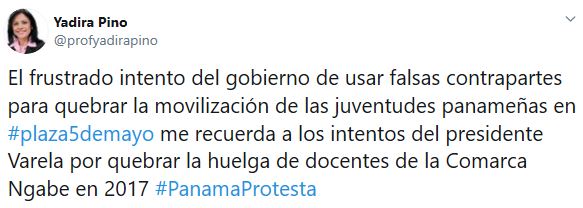
La Asamblea Nacional, con policías antidisturbios y una cerca temporal para mantener a las personas al menos a una cuadra de su edificio, ha instalado clavos en la parte superior de su cerca para evitar que alguien vuelva a escalarla.
Mientras tanto, el presidente de la Asamblea, Marcos Castillero, fue a la cerca temporal del ciclón y habló a través de ella, invitando a los manifestantes a hablar a las 9 a.m. de la mañana siguiente. Como en ‘olvida las clases, olvida tus trabajos y entra a mi conveniencia para mi espectáculo’.
Las facciones de los partidos políticos están sacando a sus “portavoces” estudiantiles pagados por algo que se supone que debe parecer negociaciones.
Quizás algunas facciones leninistas viejas y estériles aprovechen la ocasión para reavivar argumentos sobre quién es “la vanguardia”. Y hay quienes dicen que hablar es razonable, pero esperar que signifique algo o cambie algo no lo es. Y otros que discuten sobre si sería más productivo hablar con la legislatura, que puede cambiar su propuesta, o con el presidente, que no tiene poder directo en estos asuntos, pero que a menudo puede poner en línea a los diputados deteniendo selectivamente los fondos del gobierno nacional para proyectos en sus circuitos.
Las divisiones entre la gente de abajo son la gran esperanza de los poderes reales de arriba. Este tipo de tácticas han funcionado en el pasado.
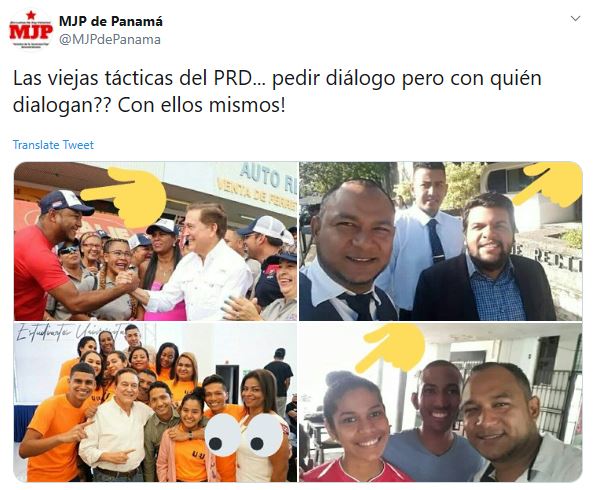
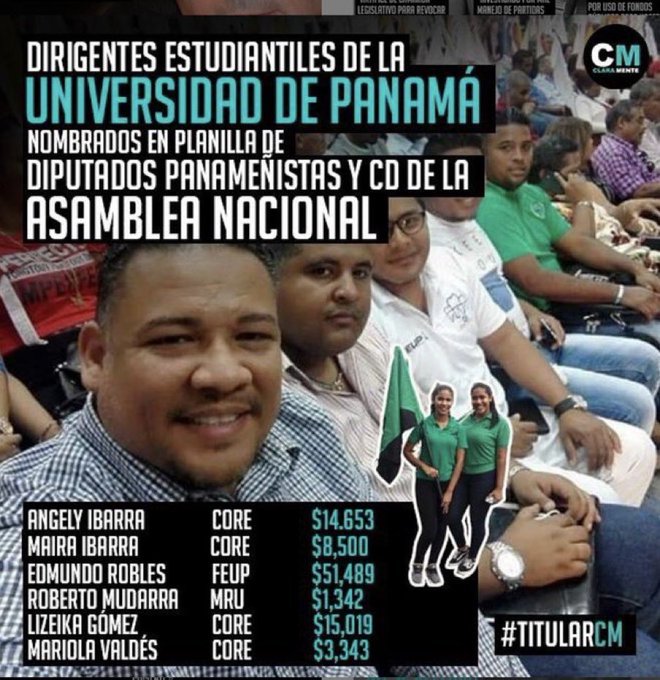
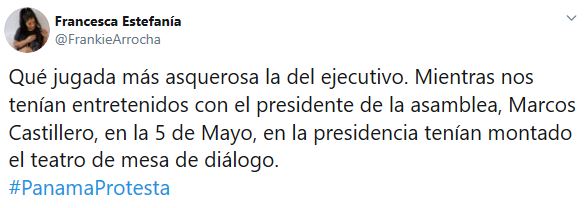
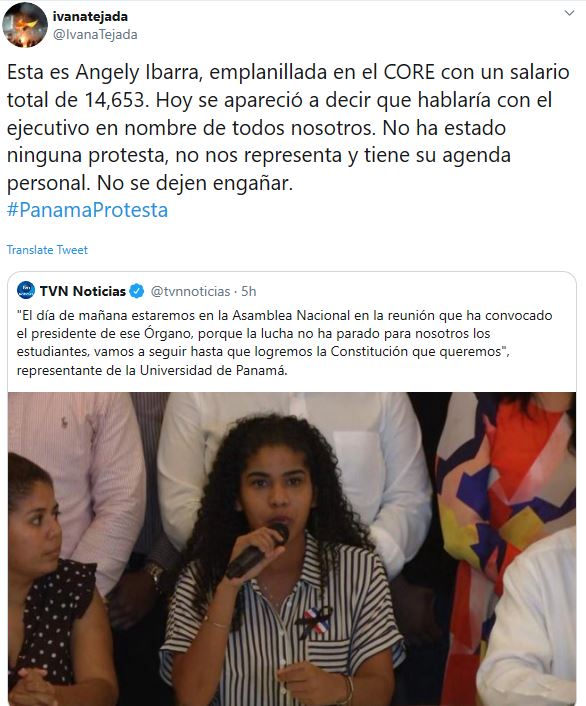
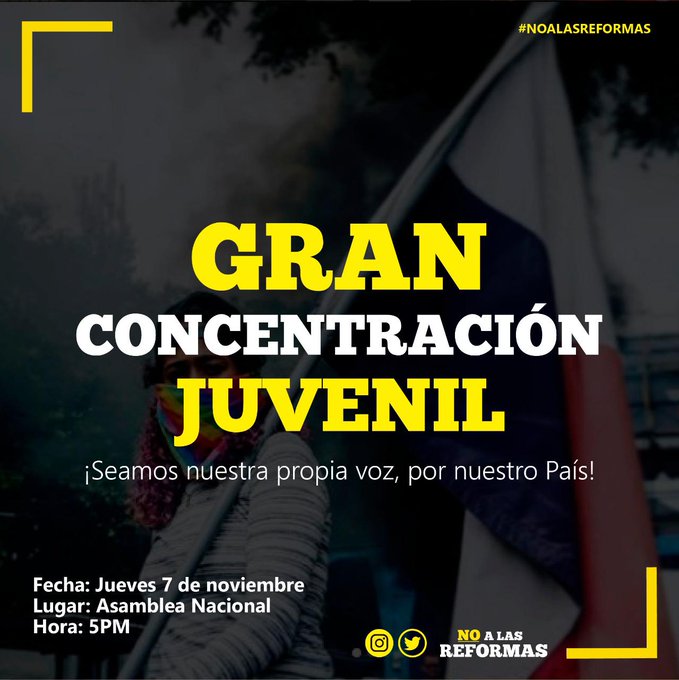
Contact us by email at fund4thepanamanews@gmail.com
Carolina Esther Cortizo Colón has moved up in her profession. An honor student at Virginia Tech, where she got her bachelor’s degree in industrial and system engineering, and then her master’s in systems engineering management, she worked for several years in management posts at Copa Airlines, being assigned tasks ranging from computer systems management to designing fare structures. As of November 1, she is CEO of Wingo, the Colombia-based low-fare subsidiary of Copa.
Then arise the rude questions, which are boorish but probably relevant in today’s venomous political atmosphere. Let’s try to outline what these may be and why they are beyond the pale of usual polite discourse.
First there are the inevitable and generally sexist aspersions that tend to be cast upon successful women everywhere. Is she really qualified, or was it some connection? On the face of it Carolina Cortizo got the right education and rose through the ranks when her dad was not president. We might argue about quality education as a privilege of the rich, and about feet in the door by being related to somebody. But Copa is not about to put someone who can’t do the job in the position of running Wingo. And actually, referring to Ms. Cortizo as “daughter of the president” again gets into the rudeness of defining a prominent woman in terms of somebody else.
Then there are the questions of familial relationships, religion and the identity of individuals and their spouses. Very taboo in Panama. Yes, to whom you are related means so very much in the Union Club and private discourse. Yes, political conspiracy theorists like to spin things around the affiliations of relations both by sanguinity and affiliation. But pretty much by law and more so by customary manners, these things are nobody’s business. Let it just be said, because others have opened that door, that Carolina Cortizo has members of her extended family on her and her husband’s side with Torrijista and Arnulfista roots.
Then there are matters of nationality. Is Carolina a Panagringa? She was born and raised Panamanian, but her mother is from Puerto Rico. As a Puerto Rican, first lady Yazmín Colón de Cortizo would perhaps have US citizenship, as Puerto Ricans were given by statute not long before she was born. Did Yazmín renounce the American part of her to become Panamanian? Was she dual to begin with? (There is a large but largely invisible community of people with mixed Puerto Rican and Panamanian roots, in part the heritage of Puerto Ricans stationed here with the US Armed Forces during the time of the bases.) And did the first lady live in US jurisdictions for enough years as a US citizen to pass American citizenship on to her children? US government policy is that questions of who is and is not a citizen, including who has renounced, are confidential data in order to protect the privacy of the individuals involved. A great many Panamanians who are also citizens of other countries hesitate to reveal that part of their identities. (But Democrats Abroad encourages Panagringas and Panagringos to come out to the voter registrars if not to the general public, for the sake for both of their countries.)
Then there are the families for whom Carolina Cortizo worked and works, and into which she married. Copa and its subsidiaries are controlled by members of the Motta family, a favorite villain of all sorts of conspiracy theorists and anti-Semites. The Mottas and how their business interests intersect with the government and with public discourse here become subjects of more legitimate comment. These things range from donations to the Independent Movement (MOVIN) to investments at Tocumen Airport to the editorial policies of the TVN television network.
Why should any of this even be mentioned in The Panama News?
Because within the PRD and the National Assembly, there have been moves to strip certain dual citizens of their Panamanian passports, identities and rights to live and work here.
Because in much of the social media trolling of Panama’s xenophobe movement a there is the vilification of the Motta family, sometimes in explicitly anti-Semitic forms. The Motta bashing is also a common avenue of attack against the independent caucus in the legislature.
Might there be a very personal reason for the president to be disgusted with some of the discourse coming from Zulay Rodríguez and her followers? Might his own immediate and extended families’ situations inform some of his opinions about this? Could be. It’s too rude to ask, but it’s out there.
Why all of these questions are generally insufferable here has in part to do with the burdens imposed on women by many men almost everywhere, but even more so has to do with Panama’s particular privacy culture. To fully understand Panama, knowledge of privacy manners is indispensable.
Having been so ill-mannered as to mention the unmentionable, let us congratulate the successful Panamanian woman, now an airline CEO. She really does have every right to be considered on her own merits.
Contact us by email at fund4thepanamanews@gmail.com
These links are interactive — click on the boxes
The protests will be getting underway again as you read these words. Hard to say what will come of them, but one good prediction is that there will be lamentations from the president about how unreasonable it all is that people dig in their heels and say “NO!” when he and those aligned with him had all these consultations are offering more.
We are assured that a powerful set of legal minds will advise on which of the changes to the “Concertation” plan that the legislators wrought are palatable. So will we get impunity for bribery and theft, ethnic cleansing and gay bashing reworked in more precise legal terminology? Will privatization schemes make further inroads into our public institutions, “legally” rather than as a product of corporate bribery? If things don’t work out, will the president call a parallel constituent asembly, to be elected under a partisan set-up managed by the partisan institution known as the Electoral Tribunal?
All interesting and important questions, but really beside the point. The big problem is not what is there but what is not there. The structural problem is that the legislators are and will be unwilling to change the undemocratic and manipulable way that they are elected, the peculation and waste and nepotism that run rampant in their offices, the obscene dodges that crooked politicians are allowed in this country. People want an end to that, the parties and their financial backers would spend a bundle to buy any election of delegates to a constitutional convention to keep things basically the way they are, and push has come to shove.
President Cortizo wants a new constitution on his shift? There would be need for election fraud and the massive spending of public funds on deceptive advertising to jam through anything remotely like what’s being discussed. But the president could show a bit of leadership and get his wise counsel to use outside the ongoing process. He could advocate promote a change in the ways of amending the constitution that’s impervious to outside manipulation by the legislature, the courts or for that matter the president. He could spell out a number of key things that he would like to see in a new constitution, and if and when an election for delegates comes around, support candidates who agree with him about those things.
The present process is doomed. To make it undead would be a political zombie invasion, the consequences of which neither Nito Cortizo nor the established political parties could control.
So stop all this stuff about notables and round tables and alliances of respectable organizations that represent hardly anybody. Lead the nation, the whole nation, if you can, Your Excellency.
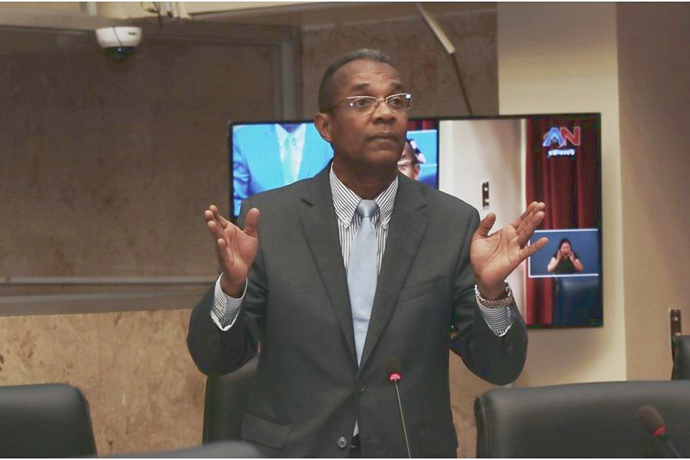
For those odd folks who follow Panamanian politics in part for entertainment, we got lowbrow comedy, high drama and educational video wrapped up in one by watching the argument between Leandro Ávila and Zulay Rodríguez.
More than one establishment pundit has opined that Zulay, with her huge packages of legislative and constitutional proposals, has not been playing to get things passed in the short term, but to dynamite the legislative and constitutional proceses while making demagogic appeals to her base. While running for the presidency she commanded the votes of well under 10 percent of the Panamanian people and was bruhed off like a tiny but annoying bug by Nito Cortizo in the PRD primary. But she got the party’s legislative caucus to make her first vice president of the National Assembly. The main power broker behind that was Benicio Robinson, who has been seen to snicker when Zulay goes into her rants. Benicio is more guarded in his words and proposals, but it serves his interest to tangle up any effort to change the constitution in a way that might call him to account for things like the very expensive baseball bats that were paid for but can’t be located.
Ávila, he’s the classic sellout former labor leader who goes with the money and power whenever possible. He knows how to count and recognizes the stuff that Zulay has been trying to put into the constitutional proposal as a set of guarantees that the thing would be voted down. And he says as much.
Whereupon Zulay calls into question the legitimacy of Ávila’s election in the first place, being awarded the San Miguelito residue seat after a challenge before the Electoral Tribunal in which discrepant numbers weren’t really explained in the ruling.
So yeah, there was a credibility problem in May’s elections, and it wasn’t the only one. Exhibit Infinity for a new constitution that the self-interested deputies would never pass were it their choice.
Not that you would ever want to believe anything that Zulay Rodríguez has to say unless amply corroborated by multiple credible sources. But there it is – the democratic bona fides of Panama’s political system are called into question and the official record doesn’t really answer the charge.
Election Day 2019 played out statewide in only a few places, plus many local and special elections. It was not a clean sweep but the Democrats did very well at all levels and with good success for both the broad centrist and progressive factions of the party and those candidates who are a bit of each.
By flipping the Virginia State Senate from red to blue, the Democrats have made it fairly certain that early next year the state will ratify the Equal Rights Amendment, 38th and last state needed for its passage into the US Constitution. Expect further Republican resistance after that. Perhaps the Republicans of the Supreme Court will find a way to strike it down. That, however, would likely worsen the GOP predicament for the 2020 elections.
By taking the Kentucky governor’s mansion from an incumbent Republican, the next governor, Democrat Andy Beshear demonstrated several things. Most alarming for the GOP is that their leader in the Senate, Mitch McConnell, faces a no longer so reliably red Kentucky electorate in 12 months’ time. More than that, the incumbent governor baited Beshear about the Green New Deal and associated the Democrat with cogresswoman Alexandria Ocasio-Cortez. Yet this pitch didn’t go over well in coal country. Beshear won much of that part of Eastern Kentucky with realistic talk about how the age of burning coal for energy is ending but that there are things that can be done to make a more just and gentle transition.
Democrats everywhere should draw some inferences. First and foremost, that although defeat can be snatched from the jaws of victory in many ways – division in the general election season the most dangerous – it is likely that any Democrat who is nominated for president will beat Donald Trump. All of the hype about electability is depreciated, leaving it for Democrats to vote for whom and what they want, without fear or compulsion. Which is how it ought to be. Democrats win not so much by pointig out the negative things the Republicans have done and might do, but by campaigning for positive things that Americans need, that Democrats want, but that are not possible without a Democratic president and congress.
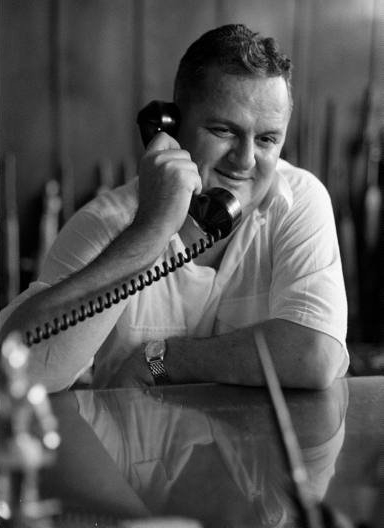
Neither millions, nor alms: we want justice.
José A. Remón
Reconciliation is more beautiful than victory.
Violeta Chamorro
Forgiving is not forgetting. Forgiving is remembering without pain.
Celia Cruz
I’ll be back and there will be millions of us.
Tupac Amaru
Contact us by email at fund4thepanamanews@gmail.com
These links are interactive — click on the boxes
So, what were the details of Panama’s smashing military victory over the 500 Colombian Army troops stationed in Colon to maintain Bogota’s authority on isthmus?
First of all, understand that most of these soldiers were bored and war-weary, people who had been mobilized for the Thousand Day War that has ended about a year earlier. Second, consider that throughout the war the Conservatives held control of Colon, Panama City and the Panama Railroad route between the two cities.
Politically, this was traditional Liberal turf. It was under Conservative control due to a great Liberal blunder at the war’s outset, an insane charge into machine gun fire on Panama City’s Calidonia Bridge over the Curundu River. There were some 500 Liberals killed in that battle, but many of their weapons were rescued and sent to the Interior, for Liberals to fight another day. That they did, in a civil war that essentially depopulated and scorched Cocle province with Liberal guerrilla general Victoriano Lorenzo grabbing the weapons from the Conservative mayor of San Carlos who died trying to intercept them, leading a retreat to a mountain stronghold northwest of El Valle, then sweeping down to take Penonome and Aguadulce. But Lorenzo had been betrayed, then executed at the Casco Viejo’s Plaza Francia some six months earlier.
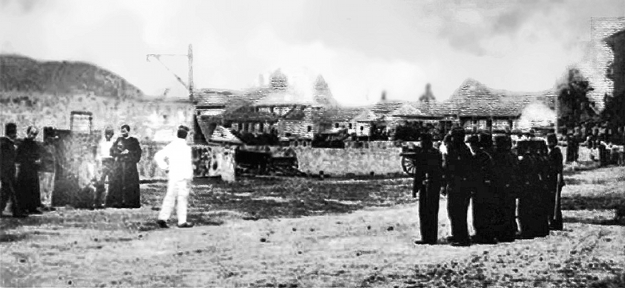
In Colombia the Conservatives had everything rigged but could not muster a quorum for the senate to approve any treaties nor muster the votes in the rump senate to pretend to do so. In Panama City, the Conservatives were politically in a bad way, not because they didn’t rule with an iron fist but because the city’s food supply from Cocle and points west was cut off both by loss of production and by a Liberal blockade. The blockade lifted with the war’s end but those who had fled their farms for the city mostly did not go back and Panama City was starving. In early 1904, when the first US Army medical mission arrived in the city, they found that the leading cause of death was beriberi, a starvation disease.
After the rump of the Colombian senate had declined to ratify a canal treaty with the United States the previous August, things were getting desperate for the shareholders in the moribund but still existing French canal company. Its concession would expire at the end of the year. Thus its shareholders, the biggest of which was the Panama Railroad, would have little or nothing to sell. The railroad company and the local Conservatives needed a new paradigm, quickly.
So a coup plot was hatched, essentially a Panama Railroad and Conservative Party conspiracy, with the connivance of the US government. The new president, Manuel Amador Guerrero, was the railroad company doctor.
The top Colombian military officers were bribed. Orders went out for the next levels of military commanders to take the train from Colon to Panama City for urgent consultations.
They got on the train, and out in the jungle near the Continental Divide the engine decoupled from the officers’ car and sped away. The troops at the Colon garrison were thus left leaderless.
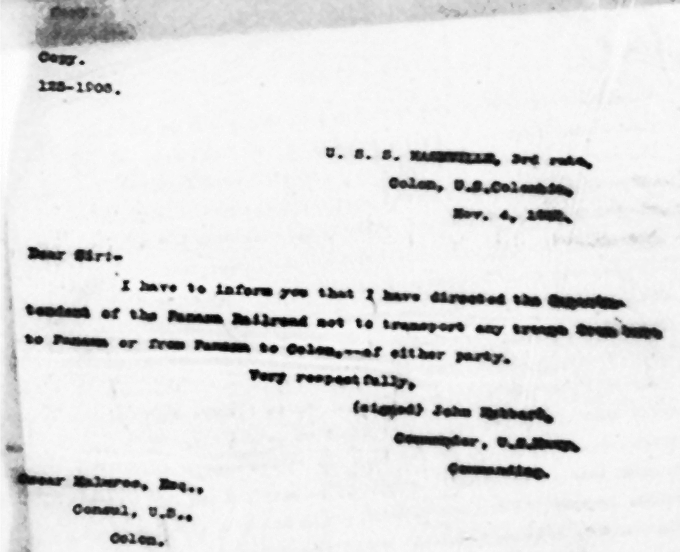
And besides, November 3 was a Colombian holiday. Even though Ecuador had gone its separate way, on November 3, 1820 Cuenca had declared independence from Spain and the Colombians still celebrated it. A boring day for bored soldiers, and the bars, stores and banks were mostly closed. However, the Colon office of the Star & Herald had money in its safe, the publisher, the mayor and those with liquor sales licenses were in on the plot and courtesy of the press all available liquor in town was purchased and delivered to the garrison. The troops got drunk en masse.
By the time that anyone sobered up enough to notice, the USS Nashville had landed and disembarked its Marine contingent. US forces were patrolling the streets.
What were the troops to do? The mayor made a gracious offer. They could get on a ship and sail back to Colombia, with guarantees of no violence or abuse from the Americans or the fine citizens of Colon.
That offer was accepted, and on November 5 the soldiers got on a ship and sailed away.
Thus went the resounding military victory in Panama’s war of independence from Colombia. Colon has celebrated it ever since.
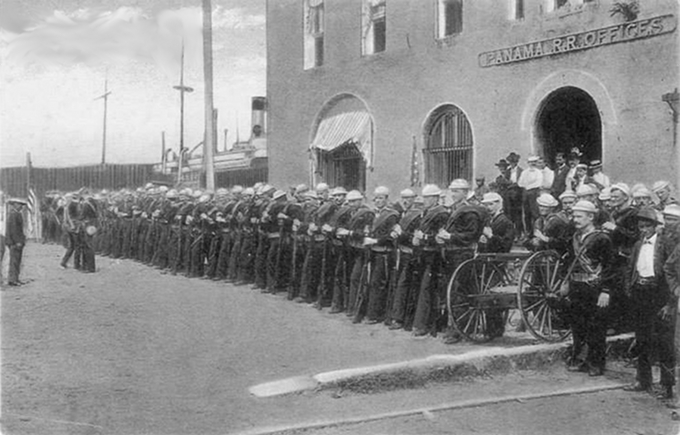
Colon had its booms and busts, never more so than in the busy days of World War II. It became one of the capitals of Caribbean English culture, something that promoted racist reactions in Panama that culminated in the 1941 constitution that stripped all Panamanians tracing descent to the non-Hispanic West Indies, the Middle East, Asia or directly from Africa of their citizenship.
But on the eve of World War II, Franklin D. Roosevelt was not about to accept one of Hitler’s friends as president of Panama. Not with ships laden with war materiel for Great Britain passing from the US West Coast through the canal to run into a gauntlet of German U-boats, some lurking right off of the Colon breakwall. A coup was arranged.
The West Indians who found work with the Americans after the canal construction was done in 1914 prospered, relatively speaking. The civilian majority of the Canal Zone population and the Panama Canal work force, they were paid much less than the white Americans. There were jobs to be had on the US military bases, too. The US Army brass – one Dwight D. Eisenhower was stationed in Panama in the 1920s, and Canal Zone governors were always US Army Corps of Engineers major generals – liked the Colonenses. The Pentagon opened up enlistment in the US Armed Forces to Panamanians, especially those who had worked for the canal or the base or the families of such people.
On the Atlantic Side the main West Indian townsite they originally called Silver City, after the pay system by which Americans were paid in gold and all others in silver, but later that became Rainbow City. A nearby shantytown across the boundary on the Republic of Panama side, Follks River, also had an Afro-Antillean flavor. (Folks River is long gone, swallowed up by Colon Free Zone expansion.)
With World War II came boom times, and the seeds of decay. Those folks who enlisted with the American forces mostly became US citizens and emigrated, many later sponsoring family members to move to the States. In 1943, as a US military project, the Trans-Isthmian Highway was built – and became a route for people to move to the capital, for Panama City residents to commute to Colon and back to work, and most ominously for Colon, for a lot of small manufacturing by which that Atlantic Side city was to an extent self-sufficient to be displaced by products coming from the other side.
Later, starting in the 1970s, roads were built along the coasts of Colon, up the Costa Arriba to Portobelo and beyond, down the Costa Abajo out past Rio Indio to Miguel de la Borda. On these roads came poorly educated people, displaced from fishing and farming pursuits. The coastal roads also became important facilities for drug smugglers and police presence was enhanced to do inconclusive battle with that.
Colon languished, and with the notable exception of during election campaigns was neglected at best or disrespected as usual in the halls of power. The big exception to that? The Colon Free Zone. Ordinarily, indolent rabiblancos will see any economic success that someone else who is unrelated has and grab at it. Bribing the government to harass the innovative business has been a favored tactic. But in the Free Zone huge fortunes were made outside of the peripheral vision of the pretentious Creole aristocracy. The Mottas in particular became very rich, too powerful for someone with the right surname to rob with a pen. During the more than 21 years of military dictatorship the illustrious families could also set up shop there but were not allowed to grab what others were building.
But in the Free Zone and in many other Colon businesses, white faces were thought essential for jobs dealing with customers, so a lot of those positions went to commuters from Panama City. There was a bit of money in government, which has seen a multipartisan succession of rapacious mayors, governors, representantes and diputados, who generally put as many family members as possible on public payrolls. Colonenses feel robbed, with justification even if they have elected these swarms of sticky fingers.
So, is Colon going to be saved? Perhaps. There is always the promise of some new project, some new gimmick, some new savior from without. The success stories have generally come from folks relying on their own resources, and have usually had to leave Colon to make their names and fortunes.
One gimmick that has been around for decades is the idea that expanding the Colon Free Zone to encompass the entire city center would bring prosperity there. Mostly, it has sent people from square mile of the low-lying island out to housing projects out on the highway. Land tenure law that prevents landlords from evicting people from condemned buildings and tenants of condemned buildings to obtain the property via squatters rights prompted an arson boom, whereby the buildings would be gone but a child or grandchild of the last person who collected rent would have a vacant lot to speculate with and hopes of the Colon Free Port making that parcel far more valuable.
Finally, progress on that gimmick – a more than $1 billion project, an overpriced no-bid contract with the Brazilian hoodlum corporation Odebrecht to renovate the city center. Without taking into account climate change that down the coast has already made some of Guna Yala’s islands uninhabitable and brings far more frequent flooding into Colon City. Without regard for all of the ongoing enterprises put out of business during construction. It’s yet another misery-bearing boondoggle with a prosperity label and a deceptive price tag.
So on this Colon Day, it’s a population that has a lot of people struggling for survival that celebrates.
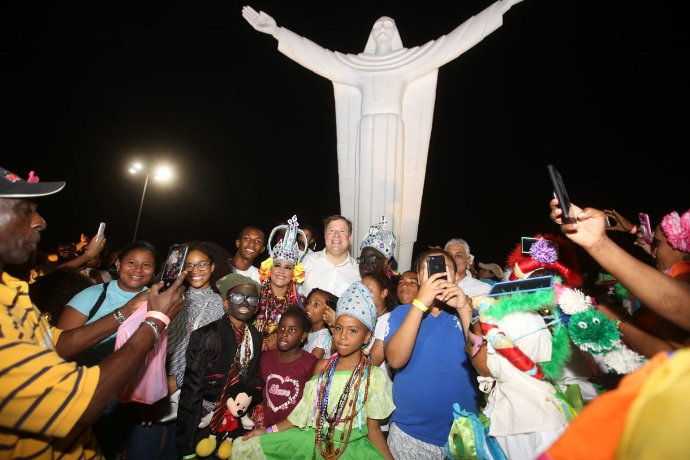
Contact us by email at fund4thepanamanews@gmail.com
These links are interactive — click on the boxes
Sí, los políticos cambiaron el nombre. Piensan que pueden cambiar los nombres tradicionales, pero prohíben cualquier cambio, si no obtengan su parte de las rentas.
Es el Día de la Bandera. Los que salen a la calle y exigen que cambiar la forma en que se maneja Panamá sí respetan los símbolos de la nación. Sin embargo, parecen preferir a Patria como el himno para esta generación de panameños.
Alcanzamos por fin la victoria
En el campo feliz de la unión!
Con cambiantes fulgores de gloria
Se ilumina la nueva nación!
Es preciso cubrir con un velo
Del pasado el Calvario y la Cruz,
Y que adorne el azul de tu cielo
De concordia la espléndida luz!
El progreso acaricia tus lares
Al compás de patriota canción!
Y te besan los pies los dos mares
Que dan rumbo a tu noble misión!
En tu suelo sembrado de flores,
A los besos del tibio terral,
Ya no pueden vivir los Señores:
Sólo reina el amor fraternal.
Adelante la pica y la pala!
Adelante sin más dilación!
Sólo así formaremos la sala
De este mundo feraz de Colón!
Hace algun tiempo
Me preguntaba un chiquillo
Por el significado
De la palabra patria
Me soprendio con su pregunta
Y con el alma en la garganta
Le dije asi
Flor de barrio, hermanito
Patria, son tantas cosas bellas
Como aquel viejo arbol
Que nos habla y renueva
Como el cariсo que guardas
Despues de muerta la abuela
Patria son tantas cosas bellas
Son las paredes de un barrio
De su esperanza morena
Es lo que lleva en el alma
Como aquel cuando se aleja
Son los martires que gritan
Bandera, bandera bandera bandera
No memorices lecciones
Dictaduras o encierros
La patria no la define
Los que suprimen a un pueblo
La patria es un sentimiento
En la mirada de un viejo
Son la entera primavera brisa de hermanita nueva
Te contesto, hermanito, Patria son tantas cosas bellas
Panameño, panameño,
panameño de mi vida,
yo quiero que tú me lleves
al tambor de la alegría.
Al Tambor de la Alegría
¿Donde esta la vida mía?
yo quiero que tú me lleves
al tambor de la alegría.
Por los santos de los cielos
y por la santa Virgen María,
yo quiero que tú me lleves
al tambor de la alegría.
Si no tienes “mergollina”
sácate la lotería,
yo quiero que tú me lleves
al tambor de la alegría.
Muchacha no seas tan tonta
cásate con policía,
yo quiero que tú me lleves
al tambor de la alegría.
Que ganan noventa pesos
trabajando noche y día,
yo quiero que tú me lleves
al tambor de la alegría.
Yo quiero pasear en coche
y también en el tranvía,
yo quiero que tú me lleves
al tambor de la alegría.
Yo quiero que tú me lleves
¿Dónde está la vida mía?
yo quiero que tú me lleves
al tambor de la alegría.
Cada uno lleva encima la huella de su sueño.
¿Quién dijo que la risa de tanta alma joven tiene que emigrar?
¿o que la llamarada de los sueños nobles ya no alumbra más?
¿quién dijo que nos ganó el olvido? ¿o que nos venció el “jamás”?
¿quien dice que hay caminos imposibles de encontrar?
¿Quién dice que perdimos, si entre las angustias sigue Panamá?
¿Quién cree que no hay manera de dar a su historia un mejor final?
Sigamos respirando, también por los demás, porque la causa es buena, no me canso de tratar.
Eh, ahe, ay ‘ombe; ahe, ahe, mi tierra, ay ‘ombe!
Eh, ahe, ay ‘ombe; ahe, ahe, mi Patria, ay ‘ombe!
¿Quién dijo que la vida se puede apuntalar a fuerza de mentiras, removiendo heridas, y olvidando amar?
¿Cómo borrar distancias sin echarnos a andar?
¿Por qué asumir que el Norte está en el Sur y delirar?
Eh, ahe, ay ‘ombe; ahe, ahe, mi tierra, ay ‘ombe!
Eh, ahe, ay ‘ombe; ahe, ahe, mi Patria, ay ‘ombe!
Yo soy de donde nace la rosa de los vientos
La azota el vendaval, pero crece por dentro
Yo soy de donde nace la rosa de los vientos
La azota el vendaval, pero crece por dentro
La rosa de los vientos!
La azota el vendaval, pero crece por dentro
Yo soy de donde nace la rosa de los vientos
La azota el vendaval, pero crece por dentro
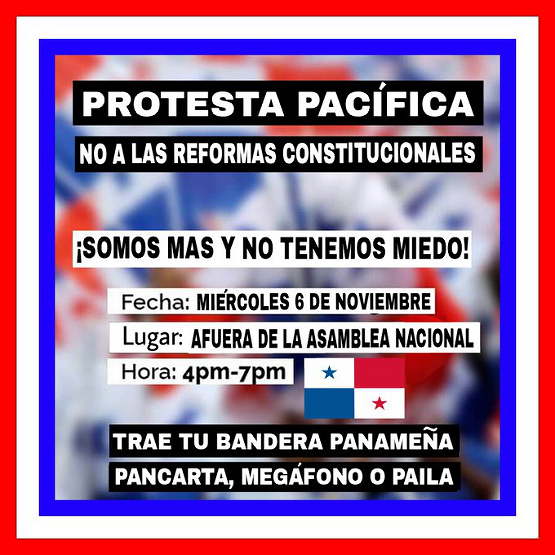
Last week, New York Times columnist Timothy Egan had a piece headlined “Why Doesn’t Mark Zuckerberg Get It?” The piece then goes on to document how Facebook has become a medium for spreading lies and nonsense all over the world, that many ill-informed users have come to believe.
This is what Egan wants Zuckerberg to “get.” While it would be nice if Zuckerberg understood the problems created by Facebook, and took effective measures to address them, the problem with Egan’s piece is that there is no reason to expect that Zuckerberg would get this point.
Zuckerberg is not a political philosopher concerned about the public good. There is a zero evidence he is a deep thinker of any sort. He is a Harvard boy who stumbled into a good idea and had the necessary connections to get very rich from it: end of story.
It is bizarre that so many people look to the country’s billionaires to tell us how the world should be constructed or think that these people have any great insight into such matters. Being a billionaire means that you were successful at getting very rich. There is no reason to believe that billionaires have any more insight into major policy issues than anyone else.
Imagine if we turned to LeBron James, a truly great basketball player, to get advice on how best to deal with global warming. LeBron is a smart guy, but no one would expect him to have special insights into dealing with global warming, in spite of his incredible skills on the basketball court. In the same vein, why would anyone think that Zuckerberg would know or care about how Facebook should be run in a way that protects democracy?
Zuckerberg runs Facebook to make to make money (lots of it), not to promote democracy. The way to fix the problems of Facebook is not to convince Zuckerberg of its harms, the way to fix Facebook is to change the law.
Ending Facebook’s exemption from libel law
The best way to address the immediate issue of concern with Facebook, that it will run political ads with lies, is simply to remove Facebook’s exemption from libel law. In the early days of the Internet, Congress passed the Communications Decency Act, which established rules for Internet. The law included a provision, Section 230, which exempted intermediaries like Facebook from libel. This provision means that Facebook, unlike the New York Times or CNN, cannot be sued if it transmits false and damaging claims about individuals, companies, or other entities.
It is difficult to see why Facebook, or any Internet intermediary, should enjoy this sort of special treatment. Zuckerberg has said that he doesn’t want to be in the business of determining what is true. It may be the case that his Facebook team is not terribly competent, but the fact is that his competitors in traditional media have been in this business for decades.
I cannot buy an ad in the New York Times or on CNN attacking Donald Trump, Joe Biden, or any other political figure unless I can demonstrate to them that the claims in the ad are true. This is partly because these companies are worried about their reputations, and don’t want to be associated with passing along lies, but also because they could be subject to a libel suit if they helped me pass along libelous claims.
Zuckerberg might argue that Facebook’s operations are highly automated, people can buy ads on Facebook without any human intervention. This means that it doesn’t have staff available to review all the ads that it runs. That is undoubtedly true, but that is Mark Zuckerberg’s problem. Just as the New York Times and CNN pay people to review the ads they run, Facebook can pay to review the ads it runs. That will cost lots of money and reduce Facebook’s profits, but so what?
It is worth noting the contrast in the treatment of copyrights and libelous material by Facebook. In accordance with the law, Facebook polices its site for copyright violations. If someone has posted material that has been identified to Facebook as infringing on a copyright, Facebook will remove it from any sites where it has been posted. By contrast, Mark Zuckerberg says Facebook doesn’t care if posted material can be shown to be false and libelous.
It is hard to see an argument as to why we should not be at least as concerned about protecting democracy as protecting copyright holders’ ability to make money from their copyrights. It may be too much to demand that Facebook preemptively review posts for libelous material, but as with copyright infringement, they can be required to remove material that has been demonstrated to be false and damaging.
The law can also require that Facebook take steps to correct the damage from any false and libelous posts. This could mean that it would post a correction to the material that would appear on any Facebook pages where the libelous material appeared.
Allowing for such corrections could be one of the items that Facebook includes in those “terms of service” that no one ever reads. If people object to the idea that they may having a correction to their libelous posting appear on their Facebook page, then they can opt not to use Facebook. (Consumer choice is great.)
Facebook and other Internet intermediaries often try to portray themselves as passive actors, like a bulletin board on the web. There are in fact many such passive bulletin board type sites on the web. The difference between these sites and Facebook, is that these sites don’t make money from advertising or their participants’ personal information. If Facebook wanted to go that route, then it could be exempted from responsibility for libelous material, just as a neighborhood bulletin board would not be held responsible for libelous material.
However, if Facebook wants to compete with print and broadcast outlets for advertising dollars, it should be held to the same rules as these outlets. There is no justification for special treatment for rich jerks from Harvard. There is no reason to waste any effort trying to convince Mark Zuckerberg what is good for democracy. We just have to tell him, and make him a pay a very big price if he is too lazy or dumb to “get” it.
Dean Baker is the co-director of the Center for Economic and Policy Research (CEPR). He is the author of several books, including Getting Back to Full Employment: A Better bargain for Working People, The End of Loser Liberalism: Making Markets Progressive, The United States Since 1980, Social Security: The Phony Crisis (with Mark Weisbrot), and The Conservative Nanny State: How the Wealthy Use the Government to Stay Rich and Get Richer. He also has a blog, “Beat the Press,” where he discusses the media’s coverage of economic issues.
Contact us by email at fund4thepanamanews@gmail.com
These links are interactive — click on the boxes
B’Tselem field fesearcher ‘Aref Daraghmeh was arrested on Thursday, October 31, at around 10:00 a.m. at Tayasir Checkpoint in the Jordan Valley (West Bank).
After being held at the checkpoint for about an hour, he was taken to a nearby military post. Soldiers left him sitting on a chair in the sun. One soldier hit him on his back. After about four hours Mr. Daraghmeh felt ill, fainted, and was taken to a nearby clinic and from it to a hospital in Afula where he received medical treatment.
At 10:00 p.m. he was moved from the hospital to the police station in the settlement of Ariel. He was held there for hours, during which police questioned him about his presence at a demonstration, which took place last week, against the settlement point (“outpost”) “Shirat ha’Asabim” that was erected in 2017. At the protest, Daraghmeh documented security forces’ conduct towards protestors.
At about 4:00 a.m. he was released.
During this whole time the military and police refused to give any information on Mr. Daraghmeh’s medical condition and whereabouts, in spite of repeated requests. His arrest yesterday is another example of the attitude of Israeli authorities towards millions of Palestinians for more than 52 years: a daily reality of violence, oppression, harassment, disregard and humiliation.
Contact us by email at fund4thepanamanews@gmail.com
These links are interactive — click on the boxes